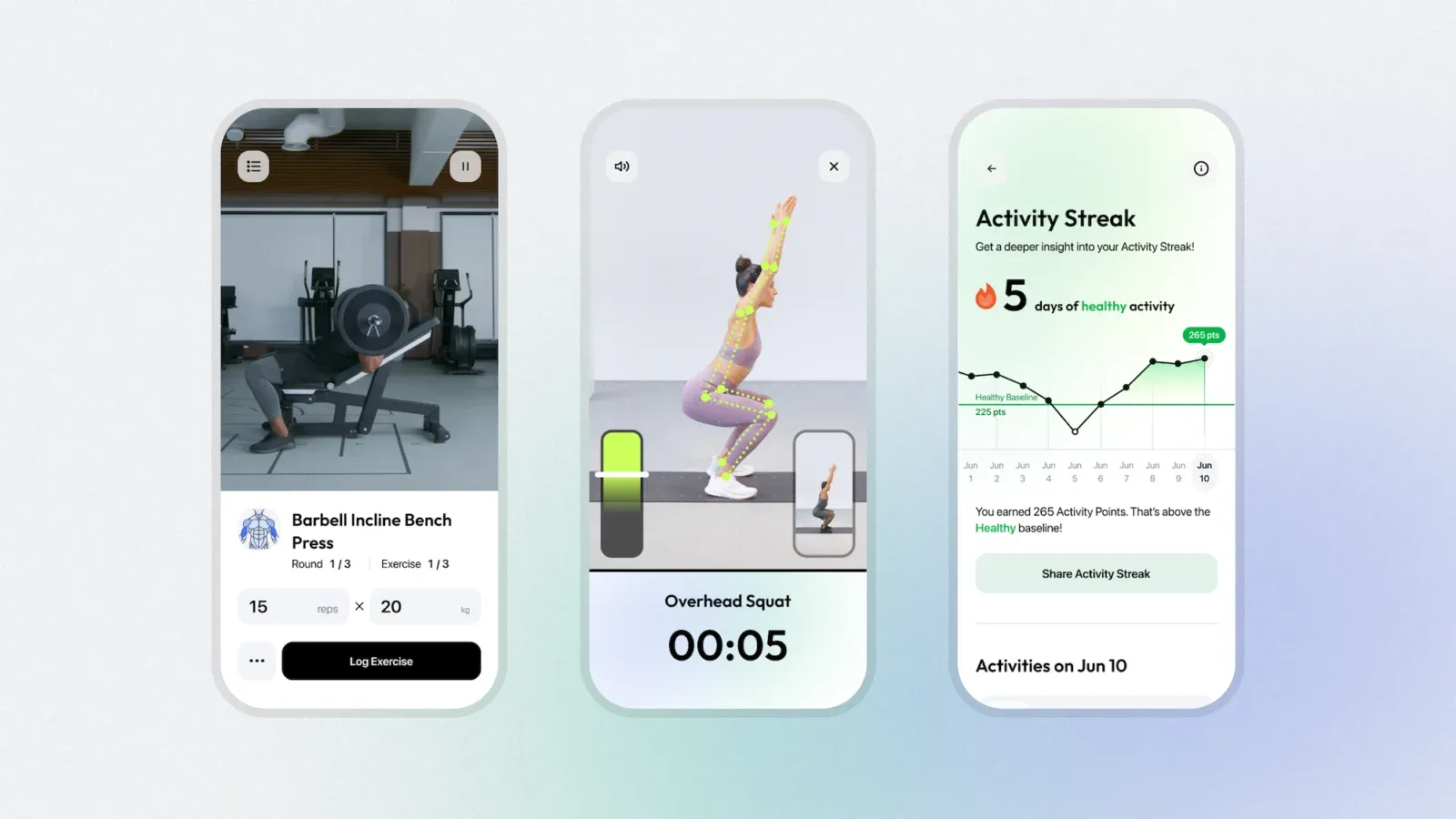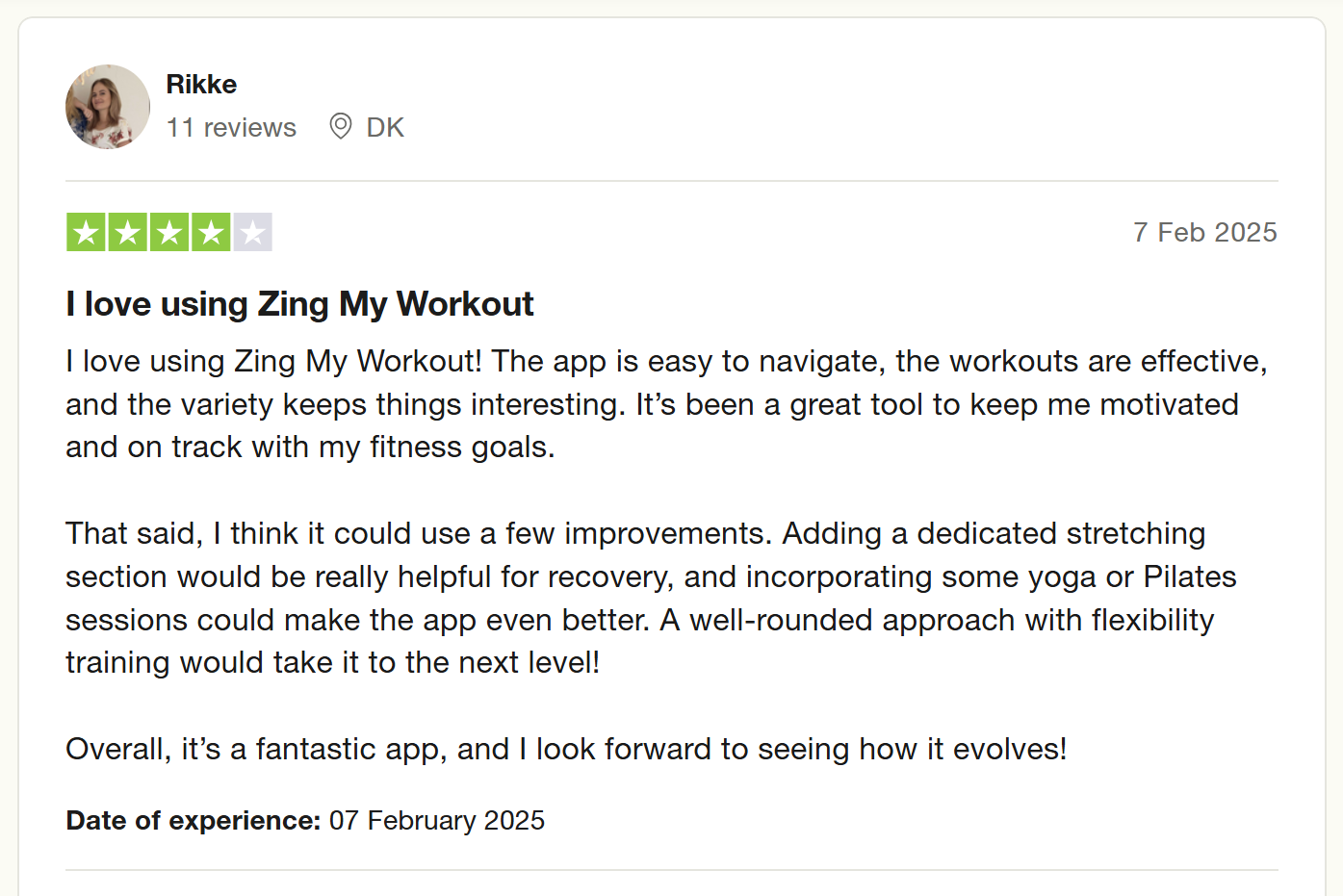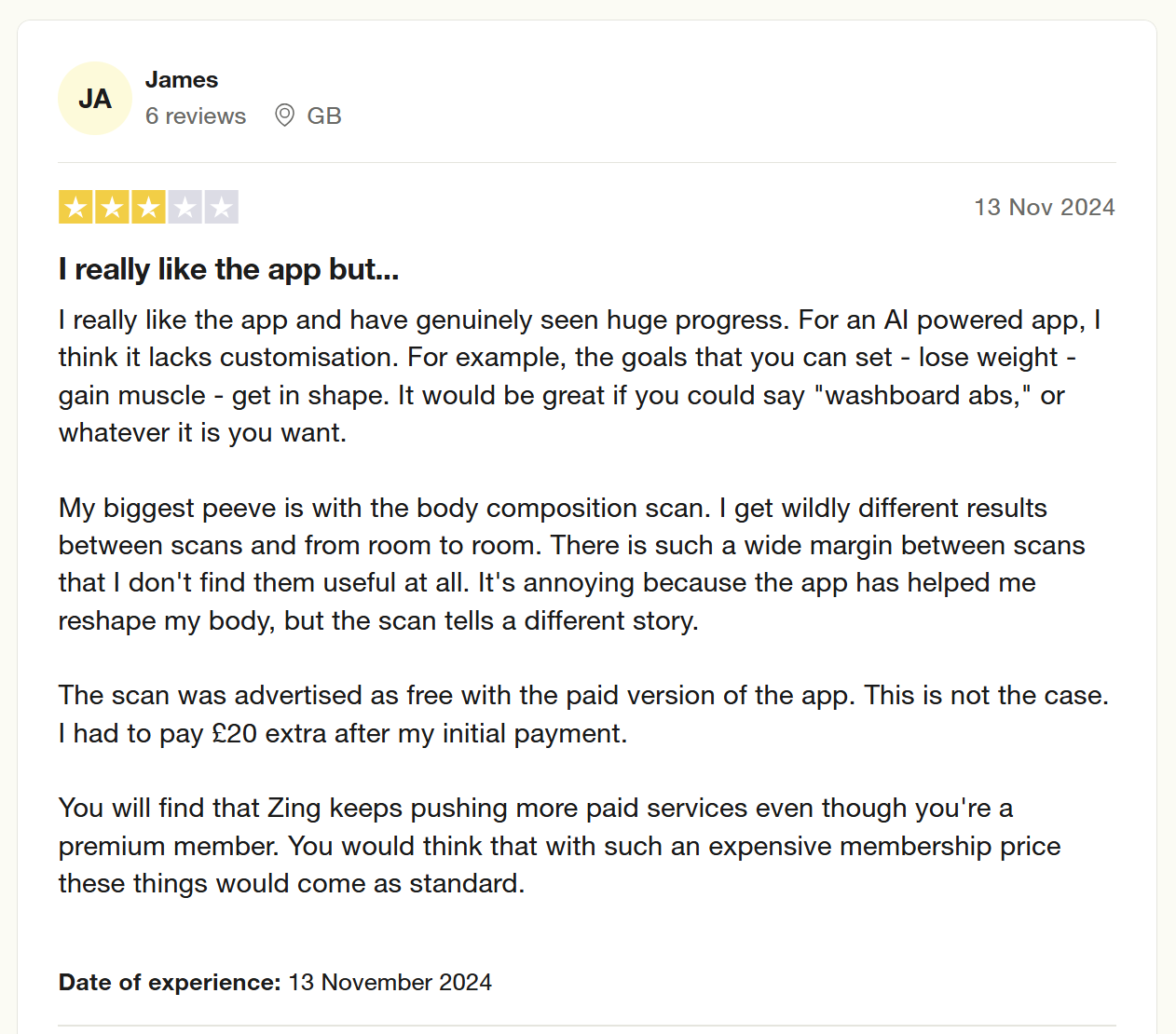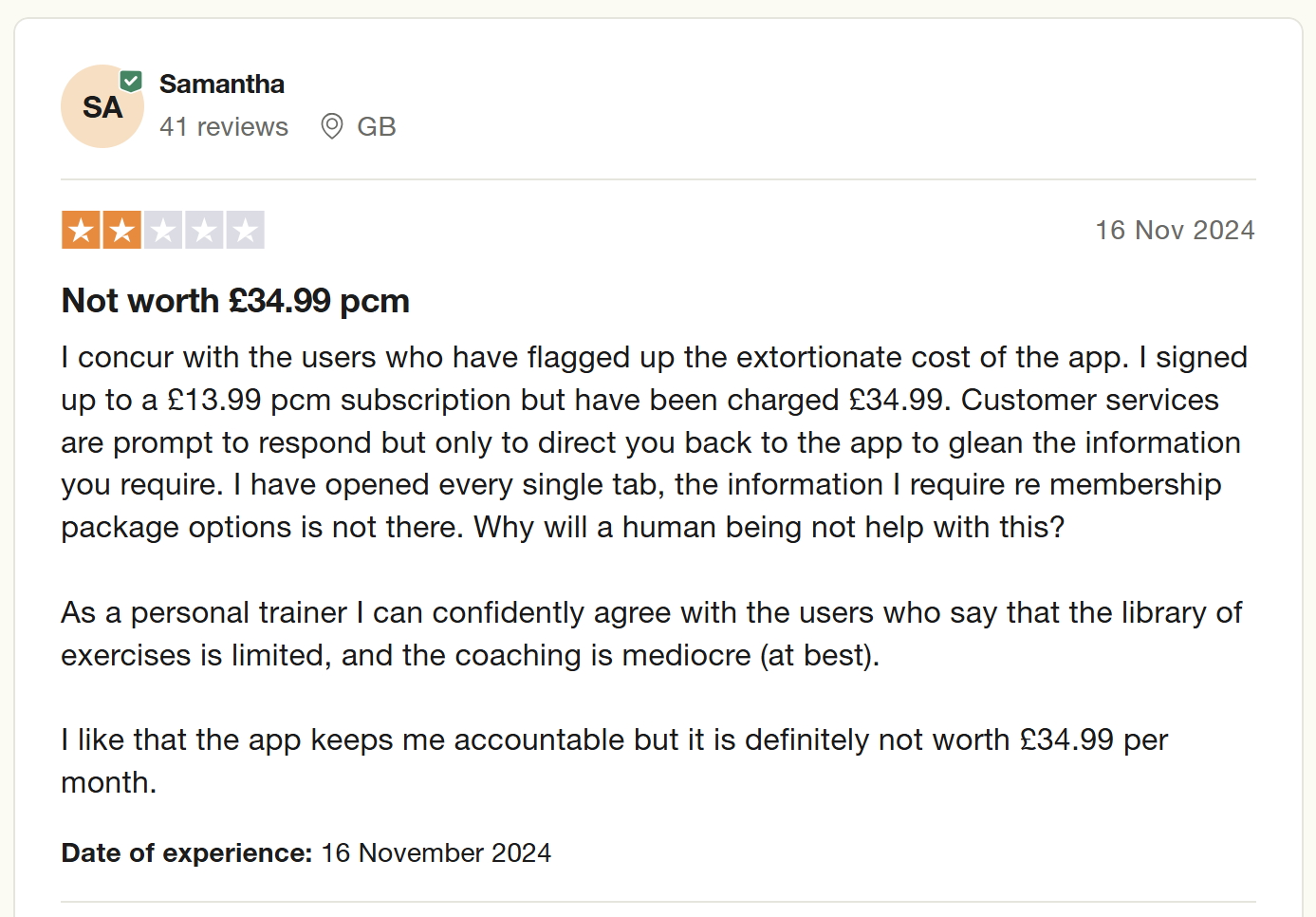Zing Coach AI Workout App: Honest Review by Expert
Beyond the hype: An independent look at AI personal training app Zing

Key Takeaways
- Zing Coach is rated 3.9 on Google Play, 4.8 on the App Store, and 3.5 on Trustpilot
- AI-Driven: Its workout plans evolve in real time based on biometric feedback and performance metrics
- Form Correction: Users report improved exercise technique with camera-based tracking
- Cost-Efficient: At $18.99/month, the premium tier undercuts personal trainer rates
- Billing concerns: Users say they have to pay even after cancelling their free trial, or for using body scan and meal plan options.
Looking for a fitness app that thinks like a personal trainer?
Zing Coach might catch your eye—but you'll want to know exactly what you're getting into before sharing your credit card details. While the app has impressive ratings on the App Store (4.8), its lower scores on Google Play (3.9) and Trustpilot (3.5) tell a more complex story.
This AI-powered fitness companion promises to transform your workouts through real-time form correction and personalized training at $18.99 per month. That's significantly cheaper than a human trainer, but be aware that some features like body scans and meal plans require additional payments.
You'll appreciate how the app adapts to your progress and uses your phone's camera to check your form - something that could save you from injury and help perfect your technique. However, many users report unexpected charges after free trials and difficulties canceling subscriptions. The app's customer service has also drawn criticism for slow response times to billing issues.
This review dives deep into what you can expect from Zing Coach, from its impressive AI capabilities to its subscription practices. Whether you're a fitness newbie or a seasoned gym-goer, we'll help you decide if this digital trainer deserves your trust—and your money.
As developers of the Dr. Muscle workout app, we believe in fostering open discussions about health and fitness.
As part of this commitment, we occasionally ask freelance professionals to share their honest opinions on various apps and programs.
In the interest of full disclosure, a qualified trainer with at least 10 years of experience was paid to author this piece. He was was paid for his time and expertise reviewing this app and sharing his honest opinions in good faith. His opinions are entirely his own.
We value transparency and believe it's important for our readers to have this context when considering the views shared in this article. As always, we recommend researching and comparing multiple independent sources before deciding on any app or product.
We are committed to providing valuable, trustworthy content. If you have any questions, please contact us at support@drmuscleapp.com.
4 Key Features of Zing Coach
Personalization and Adaptive Workout Progression
The app's AI Coach curates workouts from a library of nearly 500 exercises, tailoring routines to individual goals such as weight loss, strength building, or flexibility. Users highlight the system's ability to adjust exercise difficulty based on performance feedback. For example, if a user rates a set as "too easy," the AI increases resistance or reps in subsequent sessions.
AI Vision and Biometric Tracking
The app's proprietary Zing Vision technology utilizes smartphone cameras to monitor exercise form in real time, providing corrective feedback to optimize technique. For instance, during squats or deadlifts, the system detects deviations in posture and suggests adjustments via on-screen prompts. This feature addresses a critical gap in home fitness by replicating the oversight of a personal trainer.
Complementing this is the AI Body Scan, which analyzes body composition—including fat percentage and lean mass—through smartphone photos. Users report high accuracy compared to professional assessments, with scans informing customized nutrition and recovery plans. However, the one-time fee for full access to body composition analytics has drawn mixed reactions, as some users perceive it as an unnecessary upsell.
Integration with Wearables and Health Ecosystems
Zing Coach integrates seamlessly with Apple Health and Apple Watch, syncing activity data to provide a holistic view of fitness metrics. This interoperability allows the app to adjust workout intensity based on daily step counts, heart rate variability, and sleep patterns. Yet, synchronization issues have been reported, particularly duplicate entries in Apple Health and inaccurate activity minutes. Developers acknowledge these bugs and are working on fixes, emphasizing their commitment to refining data accuracy.---
Customization Limitations and Health Restrictions
While Zing Coach allows modifications for injuries or equipment availability, its health restriction options are currently limited to three predefined categories. Users with niche conditions, such as vertigo or wrist joint instability, find the app's alternatives inadequate. Critics argue that expanding injury-specific modifications—perhaps through user-generated input or AI-driven suggestions—would enhance accessibility. Similarly, the inability to reorder exercises during a session frustrates gym-goers when equipment is unavailable.
Pros and Cons
Pros:
Personalization Depth: Unlike competitors offering generic plans, Zing Coach’s AI incorporates 14 biometric variables—including resting heart rate variability and muscle activation patterns—to tailor workouts. This granularity enables precision matching for users with asymmetrical strength or mobility constraints.
Cross-Platform Synergy: Integration with Apple HealthKit and Strava creates a unified fitness ecosystem, though Android users face feature disparities due to delayed Google Fit integration.
Cost Efficiency: At $19.99/month, the premium tier undercuts average personal trainer rates, positioning it as an affordable entry point for budget-conscious athletes seeking expert guidance.
Cons:
Health Accommodation Gaps: While the app permits excluding exercises for knee or back injuries, it lacks accommodations for neurological conditions (e.g., Parkinson’s-related tremors) or pregnancy-specific modifications.
Workflow Interruptions: Mandatory rest period self-tracking and app background pausing disrupt high-intensity interval training (HIIT) sessions, with many of users reporting frustration during timed circuits.
Subscription Model Constraints: The free tier excludes recovery analytics and progressive overload metrics, essential for intermediate lifters. This paywall-driven stratification limits accessibility for users prioritizing strength gains over general fitness.
Reviews and Ratings
Zing Coach is currently rated 3.9 on Google Play, 4.8 on the App Store, and 3.5 on Trustpilot.



Billing and Other Complaints Against Zing Coach
Zing Coach has a TrustScore of 3.5 out of 5 on Trustpilot, has faced considerable backlash from users regarding its subscription practices and app functionality.
With over 220 reviews, a notable 32% are rated at just one star, signaling widespread dissatisfaction among its customer base. The primary complaints revolve around hidden fees, misleading advertising, and lack of effective customer support.
Many customers feel deceived by the app's subscription model, particularly those who signed up for free trials or low-cost introductory offers. Several users have reported being charged unexpectedly after their trials, often without clear communication about recurring billing.
- One user reported being charged after cancelling his free trial
- Another having to pay extra for a body scan and meal plan features
- A reviewer expressed frustration over being charged £38.95 after signing up for a £6 trial, claiming that there was no prompt to cancel amid misleading information about the subscription's nature.
This pattern has led to accusations of Zing Coach being a "scam", with complaints about unauthorized charges cropping up frequently.
Additionally, users have voiced their disappointment with the app’s functionality. Complaints include difficulties logging activities, limited exercise options, and features that require additional fees, which detracts from the overall user experience. Customers have described the app as underperforming, especially regarding its so-called personalized workout plans, which they felt did not deliver the promised value. Many have struggled to get timely resolutions or refunds from customer support, further exacerbating their frustrations.
In response to these complaints, Zing Coach's support team has continuously offered apologies and prompted dissatisfied users to reach out for assistance. While the company has made attempts to resolve specific issues, the frequency and severity of the complaints have left a significant number of users feeling exploited and disenfranchised.
As it stands, potential users are advised to approach Zing Coach with caution, weighed down by numerous advisories to thoroughly review subscription terms before committing.
User Experience and Interface Design
Intuitive Workout Execution
The app's interface receives praise for its clarity, with step-by-step exercise demonstrations and muscle-target diagrams. Real-time rep counters and form guides transform workouts into interactive experiences, described by users as "game-like" due to visual progress indicators. The Strength Score metric, which quantifies lifting performance, motivates users to surpass previous benchmarks.
Usability Shortcomings
Critical feedback centers on missing quality-of-life features. A notable omission is the lack of audible rest-period alerts, forcing users to manually monitor timers. Additionally, the app pauses workouts when switching to other smartphone apps—a disruptive limitation for multitaskers. Users also request manual input fields for reps, sets, and weights to better track progress.
Community Engagement and Support
Social Fitness Ecosystem
Zing Coach fosters accountability through Fitness Circles, where users invite friends to share achievements and compete in challenges. The accompanying Facebook group and monthly events cultivate a supportive community, with members exchanging tips and celebrating milestones. Such social features are pivotal for sustained motivation, particularly among users transitioning from structured environments like sports teams.
Developer Responsiveness
The development team actively engages with user feedback, as evidenced by prompt replies to App Store reviews. For instance, when a user suggested adding exercise reordering, developers confirmed the feature was under consideration. This receptiveness signals a commitment to iterative improvement, though some critics argue that fixes for core issues (e.g., HealthKit syncing) should be prioritized.
Limitations and Areas for Improvement
Cost Considerations
While Zing Coach's subscription model is cheaper than personal training, its premium tier—required for body scans and advanced analytics—may deter budget-conscious users. The lack of a nutrition-tracking feature further diminishes its value proposition compared to competitors like MyFitnessPal.
Repetitive Workout Recommendations
A subset of users reports redundant exercise selections, with the same movements prescribed consecutively. Such repetition risks overuse injuries and boredom, undermining the app's adaptability claims. Incorporating more diverse exercise variations and recovery-focused routines could mitigate this issue.---
Conclusion
Zing Coach represents a significant leap in AI-driven fitness, offering hyper-personalized workouts that adapt to biometric and lifestyle data. Its strengths lie in real-time form correction, integrative health tracking, and a supportive community ecosystem. However, gaps in workout flexibility, health accommodations, and basic usability features hinder its appeal for users with specific needs or preferences.
Recommendations for Potential Users: Ideal for those seeking structured, AI-guided training without the cost of a personal trainer. However, individuals requiring extensive exercise modifications or nutrition integration may find the app incomplete.
Future Directions: Expanding health restriction options, introducing audible timers, and enabling manual exercise reordering would address primary pain points. As the platform evolves, bridging these gaps could solidify Zing Coach's position as a market leader in intelligent fitness solutions.
Better Zing Coach Alternative?
If you're serious about strength training and want to avoid subscription surprises, our app Dr. Muscle offers a straightforward alternative.
While it lacks camera-based form checking, it makes up for this with science-based strength programming and transparent pricing.
What sets Dr. Muscle apart is its laser focus on progressive overload and recovery management. The app adapts your workouts in real-time based on your performance and fatigue levels.
For experienced lifters especially, Dr. Muscle provides greater control over your training. You can manually adjust weights, modify exercise selection, and customize rest periods—flexibility that Zing Coach lacks according to many users.
While you won't get the social features or general fitness options of Zing, you'll find a more reliable and specialized tool for building strength and muscle. The tradeoff is clear: fewer bells and whistles, but a more focused and dependable strength training experience.
Try Dr. Muscle, it's free.

